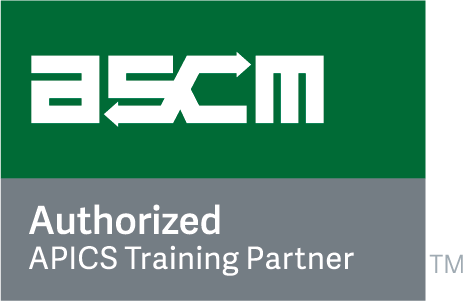- Payment Terms: Enquire
- Location: Central Area - Central
- Duration / Course length: 4 Days
- Starting Date: Enquire About It
- Timings: Enquire
Course details
CPIM Review Program APICS offers their CPIM Certified In Production and Inventory Management program to supply chain professionals. Since 1974, more than 60,000 SCM professionals have received this designation and is recognized worldwide as the measurement criterion for professional competence in manufacturing and control. In the CPIM program, participants learn to improve all functional areas of the enterprise. Employees build their skills and knowledge in materials management, while companies build leadership and increase profitability.
APICS CPIM - Part 1: Basics of Supply Chain Management
- Introduction to Supply Chain Management
- Demand Management
- Master Planning
- Material Requirements Planning
- Capacity Management
- Purchasing
- Inventory Management
- Execution and Control
- Physical Distribution
- Continuous Improvement
I. Business-Wide Concepts
In this section, common management concepts and techniques including: supply chain fundamentals, operating environments, financial fundamentals, enterprise resources planning, lean, quality fundamentals, and theory of constraints.
A. Supply Chain Fundamentals: The concept of a global network used to deliver products and services from raw materials to end consumers through a structured flow of information, physical distribution, and cash. It includes managing conflicts that occur within the supply chain. Businesses are also called upon to demonstrate social responsibility in operating their supply chains.
B. Operating Environments: Global, domestic, environmental, and stakeholder influences affect the key competitive factors, customer needs, culture, and philosophy of a company. This environment becomes the framework in which business strategy is developed and implemented.
C. Financial Fundamentals: Basic financial statements define the financial reporting common to most businesses. Underlying costs and analysis terms provide further understanding of statement information and often serve as the basis for management decisions.
II. Demand Management
This section covers sources of demand for goods and services, including a basic understanding of markets, voice of the customer and an overview of demand planning.
A. Market Driven: Consumer needs, competitive sources, economic conditions and government regulations determine the demand experienced by suppliers.
B. Voice of the Customer: Actual customer word descriptions of the functions and features that customers desire for goods and services.
C. Demand Management: Demand management is the function of recognizing all demands for goods and services to support the marketplace. Demand management serves as a key input into the sales and operations plan and master production schedule (MPS).
III. Transformation of Demand into Supply
This section includes the design of products and services, capacity management, planning, execution and control, and performance measurements.
A. Product and Process Design: Design affects product and process, the resulting framework of planning system parameters, and the requirement for data appropriate in source, content, and accuracy. Collaboration with customers and suppliers will improve product and process design.
B. Capacity Management: This section includes the function of establishing, measuring, monitoring, and adjusting limits or levels of capacity to execute all schedules. Capacity management encompasses resource requirements planning, rough-cut capacity planning, capacity requirements planning, input/output controls, and constraints management.
C. Planning: Includes the process of setting goals for the organization and choosing how to use the organization’s resources to achieve them. These different planning techniques vary depending on traditional, lean, or Theory of Constraints operating environments.
IV. Supply
This section includes the actual or planned provision of a product, component or service and its sustainability.
A. Inventory: The stocks or items used to support production (raw materials and work-in-process items), supporting activities (maintenance, repair, and operating supplies), and customer service (finished goods and service parts).
B. Purchasing Cycle: The function and responsibility for understanding demand, sourcing, procuring materials, supplies, or services, receiving goods, and approving invoices for payment.
C. Distribution: The activities associated with the movement of material between the supplier, manufacturer, and customer. These activities encompass the functions of transportation, warehousing, inventory control, material handling, order administration, site and location analysis, industrial packaging, data processing, and the communications network necessary for effective management. It includes all activities related to physical distribution, as well as the return of goods to the manufacturer.
Eligibility / Requirements
No bachelor's degree is required
Job roles this course is suitable for:
Buyer/Planner, Capacity Planner, Demand, Distribution, Lean Operations, Master Planning, Master Scheduling, Materials, Purchasing, Supply Chain, Supply Chain Analyst, Warehouse, Academic/Professor, ConsultantCourse Location
About 2 The Point Consulting Group
2 The Point Consulting Group was established in Australia in 2001 by Warren Pink, offering Coaching, Training and Facilitation, mediation and general HR consulting services.
In 2012, 2thepoint consulting expanded operations to Queensland.
In 2013, operations were expanded to Asia with the establishment of the “2 The Point Consulting Group”, Singapore office. Reg. No: 201 324 830K and forming a strategic alliance with ENS International to provide world’s best practice in Negotiation Consulting.
VISION
Changing organizations and lives by empowering their people.
MISSION
To be the company of choice for individuals and organizations by cutting through complexity and achieving consistently sustainable results.
Enquire about this course
You may add more courses here,
your list will be saved.



